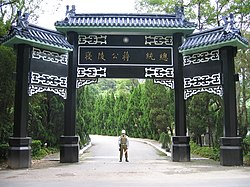Cihu Mausoleum
| Cihu Mausoleum 慈湖陵寢 |
|
|---|---|

An ROC military policeman guards the Cihu entrance paifang.
|
|
| Location | Daxi District, Taoyuan City, Taiwan |
| Built | 1975 |
| Built for | Chiang Kai-shek |
| Architect | Yang Cho-cheng |
Cihu Mausoleum (Chinese: 慈湖陵寢; pinyin: Cíhú Língqǐn), officially known as the Mausoleum of Late President Lord Chiang (Chinese: 先總統 蔣公陵寢; pinyin: Xiān Zǒngtǒng Jiǎnggōng Língqǐn) or Chiang Kai-shek Mausoleum is the temporary resting place of President Chiang Kai-shek. It is located in Daxi District, Taoyuan City, Taiwan. When Chiang Kai-shek died in 1975, he was not buried in the traditional Chinese fashion but entombed in a black marble sarcophagus since he expressed the wish to be eventually buried in his native Fenghua in Zhejiang province once the Kuomintang (KMT) recovered mainland China from the Communists.
Cihu (慈湖) literally means "benevolent lake", and it refers to the eight acre (32,000 m²) lake located near the tomb-site. The lake is divided into two smaller lakes, 5 acres (20,000 m²) and 3 acres (12,000 m²) each with a canal connecting them together. It was called formerly Green Water Lake (碧水湖澤, Hanyu Pinyin: Bìshuǐ Húzé) until Chiang Kai-shek renamed it as Cihu in 1962 because the scenery reminded him of his benevolent mother and his home town, Fenghua. Chiang loved the lake so much that he had an official residence built nearby to architecturally resemble the houses in Fenghua. He also named his favorite residence Cihu, which was converted to his mausoleum upon his death in 1975. Chiang's body lies in the main hall of the residence. The residence was designed by architect Yang Cho-cheng.
...
Wikipedia
